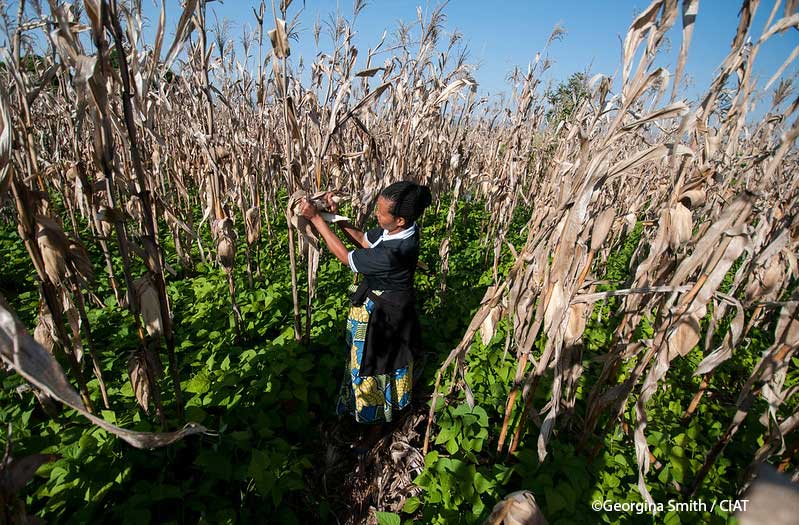Almost a year ago, we announced in this blog 3ie's collaboration with USAID’s Bureau of Resilience and Food Security (RFS) to map the existing evidence and gaps in four technical areas: agriculture-led growth, resilience, nutrition-sensitive agriculture and water security, sanitation, and hygiene (WASH). While these maps are intended to help guide RFS’ programmatic and strategic investments, they have much broader applications for the international development community as they reveal key insights into priority evidence gaps.
Why you should consider using these EGMs
These maps present a comprehensive mapping of the effectiveness evidence on agriculture-led growth, nutrition-sensitive agriculture, and resilience programming in low- and middle-income countries, with a targeted emphasis on systemic approaches.
The resilience EGM is the first comprehensive mapping of interventions that attempt to help households, communities, and country systems adapt to, mitigate, or recover from large-scale shocks and stressors.
Our WASH systematic map presents the first mapping of its kind: the literature examining achievements of WASH intermediate outcomes towards higher-level development outcomes such as prosperity, stability, and resilience.
These maps provide access to an up-to-date evidence base of 4,445 studies from over 100 low- and middle-income countries, all carefully screened using novel machine learning and artificial intelligence techniques.
“These EGMs are really exciting because they will allow us for the first time to take a consistent, cross-bureau approach to identify where evidence gaps exist, where we have enough evidence that we need to synthesize, where we have inadequate evidence and where we need to invest in additional evidence generation,” says Chris Hillbruner, Division Chief, Analysis and Learning, RFS.
What we find – key highlights
WASH
This first-of-its-kind outcome-to-outcome systematic map examines the relationship between achieving WASH outcomes and higher-level development outcomes such as prosperity, stability, and resilience in low- and middle-income countries to better understand the far-reaching impact of delivering WASH services. Learn how the WASH programming contributes to additional development goals like education, economic growth, or women’s empowerment in this blog.
View the WASH EGM map, report and brief

Resilience
This is one of the first systematic efforts to map the evidence on the effects of resilience-focused interventions – such as disaster risk financing, early warning systems, social protection, environmental and natural resource management, financial inclusion and livelihoods, social cohesion and conflict resolution, and inclusive and accountable institutions – and their outcomes related to enhancing adaptive, absorptive, and transformative capabilities in low- and middle-income countries. Sector experts recently discussed the main findings of the resilience EGM. Read the summary here and watch the full discussion here.
View the Resilience EGM map, report and brief

Nutrition
This map includes evidence on a select set of nutrition-specific and nutrition-sensitive agriculture interventions. It has a unique focus on food systems-level interventions; specifically related to production; transport and distribution; support for food processing, storage, and packaging; fortification and re-formulation; pricing and profit initiatives; market places; voluntary adoption of standards and ethical practices; women’s empowerment; and consumer behavior.
View the Nutrition-sensitive agriculture EGM map, report and brief

Agriculture-led growth
This evidence gap map covers a wide range of interventions that span from national-level policies to locally implemented programs, targeting diverse stakeholders such as smallholder farmers and other actors in local agricultural markets. Given the significant investment and priority placed on agricultural development, this map provides a comprehensive overview of the evidence landscape of systems actors and can support evidence-informed decision-making in global agricultural development.
View the Agriculture-led growth EGM map, report and brief

This blog is a very high-level summary of each of the maps, the evidence clusters and the gaps we found. To learn more, we recommend exploring the maps and the accompanying reports using the links provided and by visiting the webpage. We will also share updates on our website and through our newsletter and social media. If you have specific queries about the maps or how to use them, drop a comment below or write to us at info@3ieimpact.org.














Muy agradecido por la informacion que me comparten espero poder aportan mas adelante con los temas que abordan.
Por favor continúen apoyando a las comunidades empresas y demás beneficiarios de sus recursos y proyectos. Los mejores deseos en su labor